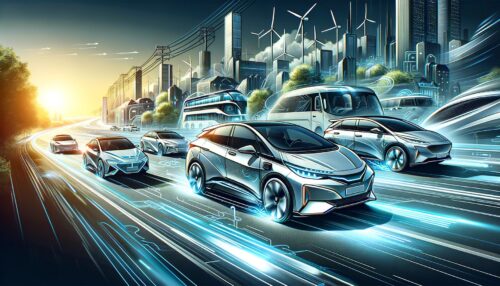
Hybrid cars have become increasingly popular as consumers look for more fuel-efficient and environmentally friendly transportation options. These vehicles combine an internal combustion engine with one or more electric motors, leveraging the strengths of both power sources to achieve greater fuel efficiency and reduced emissions compared to traditional gasoline-powered vehicles. Here’s a comprehensive look at hybrid cars, covering their types, benefits, and how they work.
Types of Hybrid Cars
- Full Hybrids (HEVs): Full hybrids can operate on just the electric motor, just the engine, or a combination of both. These vehicles do not need to be plugged in, as the battery recharges through regenerative braking and by the internal combustion engine.
- Mild Hybrids: Mild hybrid systems provide some electric assistance to the internal combustion engine, improving efficiency and performance, but cannot drive the car on electric power alone.
- Plug-In Hybrids (PHEVs): Plug-in hybrids come with larger batteries that can be charged from an external power source, allowing them to drive significant distances on electric power alone before switching to hybrid mode.
How Hybrid Cars Work
Hybrid cars typically operate through a seamless interplay between the electric motor and the combustion engine. The key components include:
- Internal Combustion Engine: This is smaller than those found in traditional vehicles and is used for propulsion and to generate electricity for recharging the battery.
- Electric Motor(s): Provides additional power to assist the engine in accelerating, passing, or climbing hills. In full and plug-in hybrids, the motor can also power the vehicle on its own for short distances.
- Battery Pack: Stores electricity for the electric motor. In PHEVs, the larger battery pack can be recharged through an external power source.
- Regenerative Braking: A key feature in hybrids, this system captures energy usually lost during braking and converts it into electricity to recharge the battery.
- Transmission: Connects the power sources to the wheels, often through an advanced electronically controlled system that manages the power blend from the engine and electric motor.
Benefits of Hybrid Cars
- Fuel Efficiency: Hybrids offer superior fuel efficiency compared to conventional vehicles by using electric power to offset fuel consumption, especially in city driving where regenerative braking is most effective.
- Reduced Emissions: By relying on electric power at times, hybrids emit fewer pollutants than their gasoline-only counterparts, contributing to cleaner air and a reduced carbon footprint.
- Tax Incentives: Many governments offer tax credits and incentives for hybrid vehicle purchases, making them financially attractive.
- Increased Energy Independence: By using less fuel, hybrids contribute to reduced oil consumption, helping countries lessen their dependence on oil imports.
- Performance Benefits: Electric motors provide instant torque, improving acceleration and overall vehicle performance.
Considerations When Buying a Hybrid Car
- Cost: Hybrids generally cost more upfront than comparable gasoline vehicles, though savings on fuel and possible incentives can offset this over time.
- Driving Habits: The benefits of owning a hybrid are most pronounced for those who do a lot of city driving, where frequent stopping allows for more regenerative braking.
- Maintenance: While the electric components of hybrid cars require less maintenance, repairs can be more expensive due to the complexity of hybrid systems.
- Resale Value: Hybrid vehicles can have higher resale values, partially due to the growing demand for fuel-efficient cars.
Hybrid cars represent a middle ground between traditional combustion engines and fully electric vehicles, offering a practical solution for those looking to reduce their environmental impact and fuel consumption. As technology advances and the cost of hybrid vehicles continues to decrease, they are likely to become an increasingly common sight on roads around the world.
